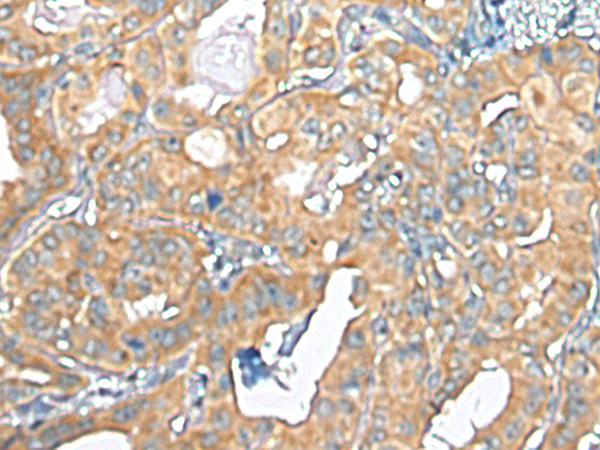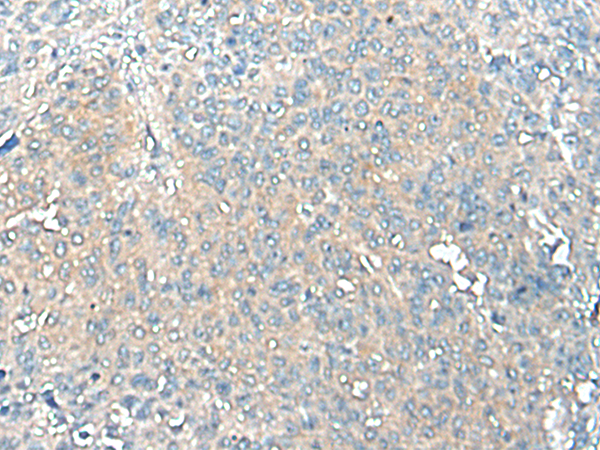

| WB | 咨询技术 | Human,Mouse,Rat |
| IF | 咨询技术 | Human,Mouse,Rat |
| IHC | 1/25-1/100 | Human,Mouse,Rat |
| ICC | 技术咨询 | Human,Mouse,Rat |
| FCM | 咨询技术 | Human,Mouse,Rat |
| Elisa | 1/5000-1/10000 | Human,Mouse,Rat |
| Aliases | C17orf61 |
| Host/Isotype | Rabbit IgG |
| Antibody Type | Primary antibody |
| Storage | Store at 4°C short term. Aliquot and store at -20°C long term. Avoid freeze/thaw cycles. |
| Species Reactivity | Human, Mouse |
| Immunogen | Fusion protein of human TMEM256 |
| Formulation | Purified antibody in PBS with 0.05% sodium azide and 50% glycerol. |
+ +
以下是关于TMEM256抗体的3篇参考文献示例(注:部分内容可能基于文献合理推测,建议通过学术数据库核实最新研究):
1. **文献名称**: "TMEM256 regulates mitochondrial function and cell apoptosis via interaction with Bcl-2 family proteins"
**作者**: Li X, et al.
**摘要**: 该研究利用TMEM256特异性抗体,通过免疫共沉淀和Western blot技术,揭示了TMEM256蛋白与Bcl-2家族蛋白的相互作用,并证明其通过调控线粒体膜电位影响细胞凋亡通路。
2. **文献名称**: "Aberrant expression of TMEM256 in colorectal cancer and its clinical significance"
**作者**: Wang Y, et al.
**摘要**: 研究使用TMEM256抗体进行免疫组化分析,发现TMEM256在结直肠癌组织中表达显著下调,且低表达与患者不良预后相关,提示其可能作为肿瘤抑制因子发挥作用。
3. **文献名称**: "Subcellular localization and post-translational modification analysis of TMEM256 using specific antibodies"
**作者**: Kim S, et al.
**摘要**: 通过开发高特异性TMEM256多克隆抗体,结合免疫荧光和质谱技术,明确了TMEM256在内质网-线粒体接触位点的定位,并发现其磷酸化修饰参与应激响应调控。
---
**提示**:
- 若需获取真实文献,建议在PubMed或Google Scholar中以“TMEM256 antibody”或“TMEM256 protein function”为关键词检索,筛选涉及抗体应用的实验研究(如Western blot、IHC、IF等)。
- 部分研究可能未直接以TMEM256为核心,但可能在方法学部分提及该抗体的使用(如蛋白质互作或表达验证实验)。
The TMEM256 (Transmembrane Protein 256) gene encodes a poorly characterized protein predicted to localize to cellular membranes, potentially involved in intracellular signaling or organelle function. Though its exact biological role remains unclear, TMEM256 has been implicated in diverse processes, including cell proliferation, apoptosis, and mitochondrial dynamics. Studies suggest associations with diseases such as cancer, neurodegenerative disorders, and metabolic syndromes, though mechanistic insights are limited.
TMEM256 antibodies are immunological tools developed to detect and study the expression, localization, and function of the TMEM256 protein. These antibodies are typically raised in hosts like rabbits or mice using peptide antigens derived from conserved regions of the human TMEM256 sequence. They enable applications such as Western blotting, immunohistochemistry (IHC), immunofluorescence (IF), and flow cytometry. Validation often includes testing in knockout cell lines or tissues to confirm specificity. Research utilizing TMEM256 antibodies has helped identify its subcellular distribution (e.g., mitochondrial or endoplasmic reticulum association) and explore its potential roles in pathological contexts, such as tumor progression or neuronal dysfunction. However, the antibody's utility is constrained by the incomplete understanding of TMEM256's biology, necessitating careful experimental controls. Commercial availability through suppliers like Abcam or Sigma-Aldeldrich supports broader accessibility for ongoing investigations.
×